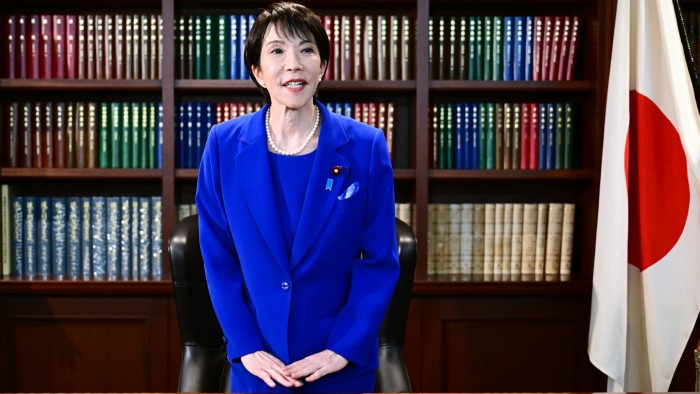
Stay informed with free updates
Simply sign up to the Japanese business & finance myFT Digest — delivered directly to your inbox.
Japan stocks surged to record highs and the yen weakened sharply against the US dollar as investors placed bets on a “Takaichi trade” of more fiscal stimulus from the country’s expected next prime minister.
The benchmark Nikkei 225 index rose by 4.1 per cent to 47,650 points on Monday in Tokyo as traders reacted to Sanae Takaichi’s election as leader of the ruling Liberal Democratic party. The broader Topix share index gained 2.3 per cent to a fresh record high. The Japanese yen weakened by 1.6 per cent against the US dollar to 149.85.
Takaichi’s ascent to leader of the LDP puts her on track to become Japan’s first female prime minister in a vote in parliament later this month. Traders in equity, bond and currency markets anticipate that her administration will expand fiscal spending and maintain pressure on the Bank of Japan to keep interest rates low.
“The Takaichi trade is a bet that Japan is heading for big fiscal stimulus, looser monetary bias, a weaker yen and a steeper yield curve, and we are seeing the market playing that pretty hard this morning,” said a Tokyo-based broker.
Shares in pharmaceuticals, auto, engineering and semiconductor companies jumped at the market open. Defence companies also rose sharply due to expectations of increased military spending under a Takaichi government. Mitsubishi Heavy had gained 13 per cent by mid-morning.
However financial stocks suffered as traders pulled back on bets that the Bank of Japan will raise interest rates this month. Resona was down 4.9 per cent while Mitsubishi UFJ was off nearly 2.5 per cent.
Going into the weekend, polling had suggested that the more fiscally cautious Shinjiro Koizumi would win the LDP leadership race.
Masamichi Adachi, an analyst at UBS, said the probability of a rate increase this month was now “less than 50 per cent” due to “two uncertainties: the US economy with the government shutdown and the new head of the government who has a dovish monetary policy stance”.
The yield on short-term Japanese government bonds fell by 5 basis points and long-dated Japanese government bonds sold off, with yields on 30-year JGBs rising 0.13 percentage points to 3.28 per cent.
Although investors have highlighted the risk that a Takaichi government would significantly expand fiscal stimulus and raise debt, some analysts expect that actual policy changes will be limited and not lead to spikes in long-dated bond yields.
“We don’t see a major disruption in the Japanese market because of Takaichi’s victory,” said Kiyong Seong, lead Asia macro strategist at Société Générale.
However, Shoki Omori, Mizuho’s chief desk strategist, wrote that investors are becoming concerned about an expected greater supply of long-dated bonds due to “prospective defense and growth-oriented spending, together with the possibility of a larger supplementary budget”.
“Accordingly, investors face a tug-of-war between the near-term volatility generated by political events and the gradual but inexorable rise in bond issuance — forces that jointly contribute to elevated uncertainty,” he added.
Takaichi “has advocated for reflation policy for a long time” so some in the market think her victory could be negative for the yen, Osamu Takashima at Citi wrote in a note.
“However, considering the political power balance in the LDP and Japan’s relationship with the US, we think it will be difficult for the next PM to implement the reflationary policies [she] has proposed.”


